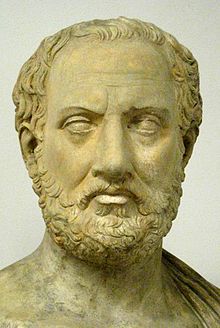
Peter Kosso [link is to his academic page], a philosopher of epistemology (or “philosopher of how we know things”), explains how historians can know “what actually happened” in ancient times. I would love to see scholars like Kosso direct their understanding and criticism to attempted explanations by biblical scholars. Well, this post is an indirect attempt to do just that by picking out some of the most salient points of his article. (Though I would love to do so, I don’t cover all the aspects and subtleties of Kosso’s essay.)
Kosso, Peter. 1993. “Historical Evidence and Epistemic Justification: Thucydides as a Case Study.” History and Theory 32 (1): 1–13. https://doi.org/10.2307/2505326.
Kosso illustrates his arguments with reference to the ancient historian with the reputation of being the father of scientific history, Thucydides.
How can we know if we can trust Thucydides’ account of the Peloponnesian war?
There are two possible ways of going about answering this question. One is external and the other internal.
- External: We can turn to outside sources, other texts or archaeological evidence, to test the claims of Thucydides.
- Internal: We can examine what was written by Thucydides himself and make a judgement based on what he himself says about himself and his work.

Four kinds of corroboration
#1 Material evidence: If surviving architectural monuments and natural terrain match what an ancient historian says then the text gains “a measure of justification”.
#2 If different authors write about the same or related things then to the extent that their accounts are consistent and further our understanding of events then “each gains credibility”.
#3 If another ancient work refers to Thucydides and discusses both him as a person and how he went about his work then we gain helpful background information to what we are reading in Thucydides’ history. But that report on Thucydides must be independent and not composed by a sycophant seeking the favours of Thucydides himself, of course.
This is to block the circularity of a theory accounting for its own evidence, a circularity that would make the testing vacuous. For the same reason, a textual source of information about some particular textual evidence must be independent of that evidence. The author of the accounting claims, for example, must not be a sycophant of the historian being described, but must have an independent source of credibility. (p. 4)
#4 What does the author say about himself and how he went about collecting his information? Does he display an awareness of the difference between eyewitness and hearsay evidence? Does he present both sides of conflicts or is he clearly biased? Do we find attention to detail? Are his explanations coherent? Is he vague in his descriptions or does he inspire confidence with realistic pictures of what actually happened? All of these features “might be used as indicators of accuracy and credibility.”
Putting Thucydides to the above tests
#1 Material evidence:
Inscriptions (e.g. of decrees authorizing the Sicilian expedition during the Peloponnesian war an records of payment to Athenian generals)
But the inscriptional evidence is so sparse and fragmentary that the touchstones are too few for any systematic or detailed justification of Thucydides. . . . Nonetheless, even these few points of contact put the text in the category of history rather than fiction and provide reason to attempt further justification of the textual evidence. (p. 7)
Solar eclipse recorded by Thucydides; this event can be dated by our own mathematical calculations.
Details of the symptoms of the Athenian plague in Thucydides’ history are so detailed that we can “speculate on the likely identity of the disease.”
#2 Corroboration by other written accounts of the same or related/relevant events:
Again there is very little such corroboration since Thucydides is the reporter on the Peloponnesian war. What corroboration there is is useful only for the most basic, simple claims about overt behavior, “outer” features, in the sense of Collingwood’s distinction between inner and outer aspects of history, and there is no accountability of this form for the more intimate of Thucydides’ claims about reasons for action and causes of conflict. (p. 7)
Thucydides’ history is valued because it is “the” source, our only source, of the Peloponnesian war. We do have historical accounts of the time before and after the period Thucydides wrote about (Herodotus and Xenophon). What we read in Thucydides’ history “fits” or appears to cohere well enough as a follow on from what Herodotus wrote and as an introduction to what Xenophon wrote about.
Much later historians, Diodorus Siculus and Plutarch, describe some events that were also discussed by Thucydides and there is even evidence to lead us to think that their accounts are based on sources other than Thucydides. (They don’t simply repeat what we know from Thucydides and cite other sources.)
This kind of accounting by agreement with related accounts in Diodorus and Plutarch is then of high quality, though still very low in quantity. (p. 8)
But once again Kosso reminds us not simply to trust the claims that Diodorus and Plutarch are genuinely independent of Thucydides.
It is important to note that the claim about independence — that Diodorus, for example, did not simply copy this particular information straight from Thucydides — is itself a historical claim. Since it describes events and situations in the past it is in need of justification, its own appeal to evidence. This demonstrates the non-foundational character of historical justification, even when it explicitly appeals to evidence. Not only are evidential claims not the terminus of justification, even their accounting claims appeal further, to other claims, for their credibility. And so on. (p. 8)
Hence the importance of examining evidence to justify treating them as independent sources:
Citations to Ephoros of Kyme indicate that Diodorus and Plutarch, both of whom wrote much later than Thucydides, did not simply echo the same Thucydidean text we are using them to test. This kind of accounting by agreement with related accounts in Diodorus and Plutarch is then of high quality, though still very low in quantity.
#3 What do other ancient authors say about Thucydides?
The testimony of outsiders is particularly important given that Thucydides was personally involved in the actions he describes.
Close involvement gave him access to information, but it also suggests that he had an opinion, a feeling for who were the good guys, and this gives reason to worry that subjective influence might cloud accuracy. Separating fact from invention must be done by close reading of the text itself and by understanding Thucydides himself through the comments of his peers. (p. 8)
The historian who wrote about Thucydides is Dionysus of Halicarnassus. He wrote a piece that he even titled Thucydides. So surely we are off to a good start? Unfortunately, as Kosso points out, Dionysus tells us exactly what we could have written ourselves from our reading of Thucydides’ text.
. . . he describes such features of the Thucydidean text as its brevity and the speed of the narrative, matters of style rather than of accuracy or methodology. In fact, Dionysius’s assessment is largely something we could do ourselves, since it is descriptive of the text and offers no special information about the author or his method as a historian. It describes the final image of the evidence but not its formation.
The textual record of claims about Thucydides and the formation of Thucydidean evidence is thus limited and disappointing. (p. 8)
#4 With such little external corroboration of Thucydides’ history we must rely upon our assessment of the text itself.
All who read this book or hear it may do so with full confidence, because it contains nothing but the truth.
— Marco Polo, Travels
In the case of Thucydides, we are left to depend largely on features of the text itself to account for its own credibility. This is a thoroughly internal justification, allowing the words of the author to justify themselves. It is internal but not necessarily as circular and epistemically vacuous as using a claim like Marco Polo’s to the effect that “everything I say is true” as reason to believe the speaker. The more effective epistemological strategy is to draw out the indirect features of justification, the unintended information that comes from reading between the lines. (p. 9)
Since internal examinations are the primary method of scholars studying the gospels a comparison with how historians studying Thucydides deserves its own treatment in another post.
In the meantime we might like to ponder how the above external methods of corroboration might be applied to the gospel narratives.
Neil Godfrey
Latest posts by Neil Godfrey (see all)
- What Others have Written About Galatians (and Christian Origins) – Rudolf Steck - 2024-07-24 09:24:46 GMT+0000
- What Others have Written About Galatians – Alfred Loisy - 2024-07-17 22:13:19 GMT+0000
- What Others have Written About Galatians – Pierson and Naber - 2024-07-09 05:08:40 GMT+0000
If you enjoyed this post, please consider donating to Vridar. Thanks!

Good post, important post. Ta
See also his book written in 2001 called: Knowing the Past: Philosophical Issues of History and Archaeology. By Peter Kosso. Amherst, NY: Humanity Books, 2001. Pp. 200. He begins his book with the following two sentences:
“Some of what we claim to know about the past is true; the rest is false. The purpose of this book is to
describe ways of telling the difference” (11)
Thanks. It’s in my “to read basket” which is already as high as the ceiling! :-/